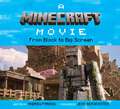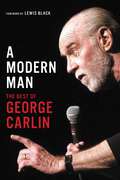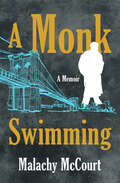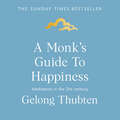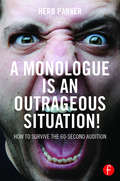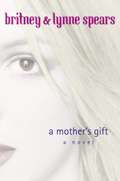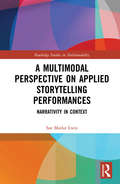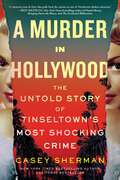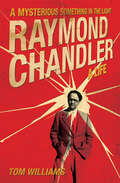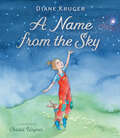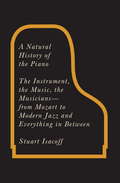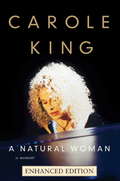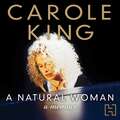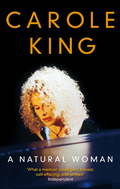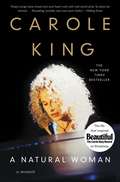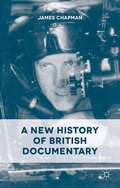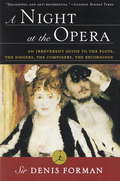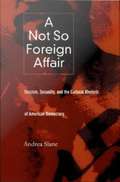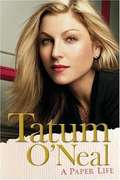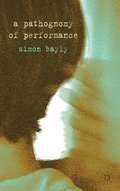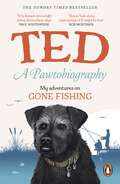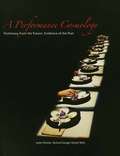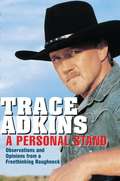- Table View
- List View
A Minecraft Movie: From Block to Big Screen
by Andrew FaragoGo behind the scenes of A Minecraft Movie and experience the creative journey that transformed the biggest video game of all time into a big-screen block-buster.Break open the filmmaking secrets of A Minecraft Movie with this deluxe art book. Featuring commentary from the filmmakers, this volume explores how a team of world-class artists brought the iconic, limitless world of Minecraft to the big screen. Including insights from the creatives as well as stunning illustrations and visuals––such as never-before-seen concept art and photography––this book is the ultimate companion to the first ever live-action adaptation of Minecraft. NEVER-BEFORE-SEEN IMAGERY: From character, mob, and item designs to images of in-world Minecraft locations and stunning photography, this book offers an incredible gallery of visuals from A Minecraft Movie. INTERVIEWS WITH CREATORS: Immerse yourself in the world of Minecraft like never before with exclusive behind the scene insights from the game creators and filmmakers. MINE THE CREATIVE CRAFT: Follow the filmmaking process of adapting the biggest video game of all time via beautiful concept art, amazing photography, and more.
A Modern Man: The Best of George Carlin
by George CarlinExperience George Carlin as you&’ve never seen him in this collection highlighting his greatest hits and achievements, including never-before-seen material. It is impossible to talk about 20th century comedy without discussing George Carlin. Named the 2nd greatest standup of the 20th century by both Comedy Central and Rolling Stone, Carlin garnered multiple gold records, 4 Grammys, 6 Emmy nominations, and the Mark Twain Prize for American Humor. He was the first host of SNL, appeared on the Tonight Show some 130 times, and acted in beloved films like Bill and Ted&’s Excellent Adventure and Dogma. Dubbed &“the dean of counterculture comedians,&” George Carlin was an American icon. A perfect introduction for new fans and a worthy addition to the collections of old fans, The Best of Carlin showcases the longevity, range, and—above all—hilarity of the master. Filled with thoughts, musings, questions, lists, beliefs, curiosities, monologues, assertions, assumptions, and other delicious verbal ordeals, it is drop-dead funny tour through Carlin&’s mind. More than ten years after his death, Carlin&’s characteristically ironic takes on life's annoying universal truths remain thoughtful, fearless, and somehow more relevant than ever.
A Monk Swimming: A Memoir
by Malachy McCourtIn this &“irresistible memoir that&’s equal parts pathos and belly laughs,&” the Irish American writer and actor shares stories from his first decade in the US (People). Malachy McCourt left behind a childhood of poverty and painful memories of his father and mother in Limerick, Ireland, when he followed his brother, Frank, to America in 1952. In A Monk Swimming, McCourt recounts the decade that followed. With not much to his name other than his sharp wit and knack for storytelling, McCourt was unsure what he would do after arriving in New York City. He worked as a longshoreman on the Brooklyn docks, became the first celebrity bartender in a Manhattan saloon, performed on stage with the Irish Players, and told tales to Jack Paar on The Tonight Show. Although McCourt gained success, money, women, and, eventually, children of his own, he still carried memories of the past with him. So, he fled again. He found himself in the Manhattan Detention Complex, otherwise known as the Tombs. He was arrested several times: poolside in Beverly Hills, in Zurich with gold-smugglers, and again in Calcutta with sex workers. McCourt&’s journey also took him to Paris, Rome, and even Limerick again, until finally he was forced to grapple with his past. &“[A] funny, oddly winning book.&” —The New York Times &“A rollicking good read that, as the Irish say, would make a dead man laugh.&” —The Philadelphia Inquirer &“A triumphant tale. . . . You will find yourself laughing through the tears.&” —Newsday &“Howlingly funny.&” —Atlanta Journal-Constitution &“Build[s] on the story of the McCourts&’ early life so dazzlingly told in Angela&’s Ashes by his brother Frank.&” —Thomas Keneally, author of the international bestseller Schindler&’s List
A Monk's Guide to Happiness: Meditation in the 21st century
by Gelong ThubtenA guide to meditation and mindfulness written by Buddhist monk Gelong Thubten.Modern life is fast-paced and demanding - we're constantly racing from one place to the next, mentally and physically, but how often do we pause and consider whether we're truly happy?A Monk's Guide to Happiness is an insightful and practical guide to meditation, mindfulness and the nature of true, lasting happiness. This book will help you to understand the power of meditation, living in the present, and how this can transform your life. Thubten's expertise lies in teaching meditation and he's introduced mindfulness and calm into the lives of many. He's taught everywhere from law firms and banks to schools and prisons; he will teach you how to choose happiness and mental calm. Gelong Thubten draws upon all that he has learned during his many years of meditation practice, including several years in intensive retreats, and also his many years of experience teaching people from all walks of life and backgrounds, making this book accessible and rooted in reality.In A Monk's Guide to Happiness, Thubten teaches us how to meditate, how to be more 'awake' in life, how to train our minds and reprogramme our stress response and how to introduce 'micro moments' of mindfulness into our daily lives. Through mindfulness we can discover the deeper potential of the mind - our inherent compassion, wisdom and true freedom.(P)2019 Hodder & Stoughton Limited
A Monologue is an Outrageous Situation!: How to Survive the 60-Second Audition
by Herb ParkerA Monologue is an Outrageous Situation! How to Survive the 60-Second Audition explains how to successfully tackle the "cattle call" acting audition with a sixty-second monologue. Through Q&As, tips, director’s notes, and a glossary full of outrageous actions meant to inspire the actor into truly connecting with the piece, this book shows actors where and how to find a monologue, edit it, and give the best audition possible.
A Mother's Gift
by Britney Spears Lynne SpearsHolly Faye Lovell sure can sing. Everyone in Biscay, Mississippi, knows that. And when at fourteen she becomes the youngest student ever to win a full scholarship to the prestigious Haverty School of Music, her dream of pursuing a singing career is on its way. But for the first time in her life, Holly must leave behind her mother, Wanda. Although they don't have much in the way of money, there's always been plenty of love. . . and there's always been Wanda's birthmark, an ugly red scar on the side of her face that makes people who don't know her turn away. Now that Holly's off with her posh new friends and new life, she's ashamed to find herself embarrassed by her mom and their humble background. And Wanda finds herself wanting to reveal a long-hidden secret . . . a secret that could destroy their bond forever.
A Multimodal Perspective on Applied Storytelling Performances: Narrativity in Context (Routledge Studies in Multimodality)
by Soe Marlar LwinIn this volume, Soe Marlar Lwin proposes a contextualized multimodal framework that brings together storytelling practitioners’ and academic researchers’ conceptions of storytelling. It aims to highlight the ways in which various institutions in contemporary society have been using live storytelling performances as an effective communicative, educative and meaning-making tool. Drawing on theories of narrative from narratology as well as from related fields such as discourse analysis, multimodal analysis, communication and performance studies, the author proposes a contextualized multimodal framework to (a) uncover the potential narrativity of a live storytelling performance through an analysis of narrative elements constituting the story, (b) capture the process of developing actual narrativity through a multimodal analysis of performance features in the storytelling discourse, and (c) highlight the importance of context and dynamics between the storyteller and audience for an achievement of optimal narrativity in a particular storytelling event. The sample analysis shows how the framework not only describes the system governing institutionalized storytelling performances in general but also serves as a useful model to examine individual performance as a unique realization of the general system. The book also offers implications for possible applications of such contextualized multimodal frameworks more broadly across the disciplines.
A Murder in Hollywood: The Untold Story of Tinseltown's Most Shocking Crime
by Casey ShermanUSA TODAY BESTSELLER"A wild ride beneath the glitz and glamour of 1950s Hollywood, proving once again that Casey Sherman is a master of the genre."—Ben Mezrich, New York Times bestselling author of Dumb Money, Bringing Down the House, and The Accidental BillionairesThe dark story behind the bright lights of TinseltownFrom the outside, Hollywood starlet Lana Turner seemed to have it all—a thriving film career, a beautiful daughter, and the kind of fame and fortune that most people could only dream of. But when the famous femme fatale began dating mobster Johnny Stompanato, thug for the infamous west coast mob boss Mickey Cohen, her personal life became violent and unpredictable. Lana's teenage daughter, Cheryl, watched her beloved mother's life deteriorate as Stompanato's intense jealousy took over. Eventually, the physical and emotional abuse became too much to bear, and Lana attempted to break it off with Johnny—with disastrous consequences. The details of what happened that fateful night remain foggy, but it ended in a series of frantic phone calls and Stompanato dead on Lana's bedroom floor, with Cheryl claiming to have plunged a knife into his abdomen in an attempt to protect her mother. The subsequent murder trial made for the biggest headlines of the year, its drama eclipsing every Hollywood movie.New York Times bestselling author Casey Sherman pulls back Tinseltown's velvet curtain to reveal the dark underbelly of celebrity, rife with toxic masculinity and casual violence against women, and tells the story of Lana Turner and her daughter, who finally stood up to the abuse that plagued their family for years. A Murder in Hollywood transports us back to the golden age of film and illuminates one of the 20th century's most notorious true crime tales.
A Mysterious Something in the Light: Raymond Chandler: A Life
by Tom Williams“A remarkably detailed portrait of the famously hard-boiled writer” and creator of the popular gumshoe, Philip Marlowe (Publishers Weekly).What we know of Raymond Chandler is shrouded in secrets and half-truths as deceptive as anything in his magisterial novel The Long Goodbye. Now, drawing on new interviews, previously unpublished letters, and archives on both sides of the Atlantic, literary gumshoe Tom Williams casts light on this most mysterious of writers.The Chandler revealed is a man troubled by loneliness and desertion from an early age—experiences that fueled his writing as much as they scarred his life. Born in Chicago in 1888, his childhood was overshadowed by the cruel collapse of his parents’ marriage and his father’s alcohol-fueled violence. After his mother fled America, Chandler was schooled in London, but felt constrained by the stuffy English class system, eventually returning to the land of his birth, where—in corruption-ridden Los Angeles—he met his one great love: Cissy Pascal, a married woman eighteen years his senior.It was only during middle age, after his own alcoholism wrecked a lucrative career as an oilman, that Chandler seriously turned to crime fiction, although his success was to prove bittersweet. An obsessive attitude towards his craft, unrealized literary ambitions and a suicidal turn after Cissy’s death combined to prevent him from recapturing the verve of his earlier writing. But his legacy—the lonely, ambiguous world of Philip Marlowe—endures, compelling generation after generation of crime writers to go down mean streets.In this long-awaited new biography, the most thorough and comprehensive yet written, Tom Williams shadows one of the twentieth century’s true literary giants and considers how crime was raised to the level of art.Praise for A Beautiful Something in the Light“Williams dutifully records these facts but deftly keeps the reader interested. . . . [A Beautiful Something in the Light] is well researched, but because it is so well written it should be of interest to scholars and mystery fans alike.” —Washington Independent Review of Books“Outstanding. . . . Williams writes sensitively about the Cissy relationship and delves illuminatingly into the composition of Chandler’s masterpieces. . . . Thanks to his biography Chandler himself is a less mysterious something than he was.” —Sunday Times (UK)“Precise, kindly, and necessary.” —Scotland on Sunday (UK)“A clear-eyed, compassionate biography.” —Kirkus Reviews
A Name from the Sky
by Diane KrugerFrom actress and mom Diane Kruger comes an enchanting story about how learning the meaning of her name changed her life—and how our names can help us find our own special powers.&“Beautiful….Such a great new baby gift - on my go-to gift list.&” — Zibby Owens, Moms Don&’t Have Time to Read Books&“Beautiful.&” — Hoda Kotb, Today with Hoda & Jenna"Diane Kruger is celebrating the power of a name." — People Magazine. Do you know where your name comes from? Growing up in Germany, like so many children around the world, Diane Kruger felt like she didn't fit in with the other kids. There was the pet bunny she talked to like a friend, her love of books, and even her name, which was unusual for her country. But when Diane&’s mother tells her the origin of her name—everything changes! Inspired by Diana, goddess of the hunt and magical protector of animals, Diane learns that she, too, will find her own special powers someday. On a trip to England, Diane and her mother visit the theater, and she is spellbound, realizing she&’s meant to be an actress. This warm and relatable autobiographical story comes full circle when Diane explains how she chose her own daughter&’s name, and invites readers to learn the meaning behind their own name and discover their own special powers. Illustrated in a classic storybook style by fine artist Christa Unzner, this book is sure to instill wonder as it inspires children to follow their dreams and passions.
A Natural History of the Piano: The Instrument, the Music, the Musicians from Mozart to Modern Jazz and Everything in Between
by Stuart IsacoffA beautifully illustrated, totally engrossing celebration of the piano, and the composers and performers who have made it their own. With honed sensitivity and unquestioned expertise, Stuart Isacoff--pianist, critic, teacher, and author of Temperament: How Music Became a Battleground for the Great Minds of Western Civilization--unfolds the ongoing history and evolution of the piano and all its myriad wonders: how its very sound provides the basis for emotional expression and individual style, and why it has so powerfully entertained generation upon generation of listeners. He illuminates the groundbreaking music of Mozart, Beethoven, Liszt, Schumann, and Debussy. He analyzes the breathtaking techniques of Glenn Gould, Oscar Peterson, Vladimir Ashkenazy, Arthur Rubinstein, and Van Cliburn, and he gives musicians including Alfred Brendel, Murray Perahia, Menahem Pressler, and Vladimir Horowitz the opportunity to discuss their approaches. Isacoff delineates how classical music and jazz influenced each other as the uniquely American art form progressed from ragtime, novelty, stride, boogie, bebop, and beyond, through Scott Joplin, Fats Waller, Duke Ellington, Bill Evans, Thelonious Monk, Chick Corea, Herbie Hancock, Cecil Taylor, and Bill Charlap. A Natural History of the Piano distills a lifetime of research and passion into one brilliant narrative. We witness Mozart unveiling his monumental concertos in Vienna's coffeehouses, using a special piano with one keyboard for the hands and another for the feet; European virtuoso Henri Herz entertaining rowdy miners during the California gold rush; Beethoven at his piano, conjuring healing angels to console a grieving mother who had lost her child; Liszt fainting in the arms of a page turner to spark an entire hall into hysterics. Here is the instrument in all its complexity and beauty. We learn of the incredible craftsmanship of a modern Steinway, the peculiarity of specialty pianos built for the Victorian household, the continuing innovation in keyboards including electronic ones. And most of all, we hear the music of the masters, from centuries ago and in our own age, brilliantly evoked and as marvelous as its most recent performance. With this wide-ranging volume, Isacoff gives us a must-have for music lovers, pianists, and the armchair musician.From the Hardcover edition.
A Natural Woman
by Carole KingThe enhanced ebook includes dozens of exclusive of photos from Carole King's childhood, her own family, and behind-the-scenes images from her performances. It also features a video of the author in the recording studio, and two classic songs embedded within the ebook. A memoir by the iconic singer-songwriter chronicling her story from her beginnings in Brooklyn through her remarkable success as one of the world's most acclaimed musical talents, to her present day as a leading performer and activist. From her marriage to Gerry Goffin, with whom she wrote dozens of songs that hit the charts, to her own achievements, notably with "Tapestry," which remained on the charts for more than six years, to her experiences as a mother, this memoir chronicles one of music's most successful and fascinating stars. The book will include dozens of photos from King's childhood, her own family, and behind-the-scenes images from her performances over the years.
A Natural Woman
by Carole KingA memoir by the iconic singer-songwriter chronicling her story from her beginnings in Brooklyn through her remarkable success as one of the world's most acclaimed musical talents, to her present day as a leading performer and activist. From her marriage to Gerry Goffin, with whom she wrote dozens of songs that hit the charts, to her own achievements, notably with "Tapestry," which remained on the charts for more than six years, to her experiences as a mother, this memoir chronicles one of music's most successful and fascinating stars. The audiobook will include a pdf of dozens of photos from King's childhood, her own family, and behind-the-scenes images from her performances over the years.
A Natural Woman: A Memoir
by Carole KingA memoir by the iconic singer-songwriter chronicling her story from her beginnings in Brooklyn through her remarkable success as one of the world's most acclaimed musical talents, to her present day as a leading performer and activist. From her marriage to Gerry Goffin, with whom she wrote dozens of songs that hit the charts, to her own achievements, notably with 'Tapestry', which remained on the charts for more than six years, to her experiences as a mother, this memoir chronicles one of music's most successful and fascinating stars. The book includes dozens of photos from King's childhood, her own family, and behind-the-scenes images from her performances over the years.
A Natural Woman: A Memoir
by Carole KingRead the New York Times Bestselling memoir that is "revealing, humble, and cool-aunt chatty" about the incredible life that inspired the hit Broadway musical Beautiful (Rolling Stone). Carole King takes us from her early beginnings in Brooklyn, to her remarkable success as one of the world's most acclaimed songwriting and performing talents of all time. A Natural Woman chronicles King's extraordinary life, drawing readers into her musical world, including her phenomenally successful #1 album Tapestry, and into her journey as a performer, mother, wife and present-day activist. Deeply personal, King's long-awaited memoir offers readers a front-row seat to the woman behind the legend. The book will include dozens of photos from King's childhood, her own family, and behind-the-scenes images from her performances.
A New History of British Documentary
by James ChapmanA New History of British Documentary is the first comprehensive overview of documentary production in Britain from early film to the present day. It covers both the film and television industries and demonstrates how documentary practice has adapted to changing institutional and ideological contexts.
A Night at the Opera: An Irreverent Guide to The Plots, The Singers, The Composers, The Recordings
by Denis FormanThis slightly irreverent guide to opera summarizes the plots of 17 of the world's great operas, including Aida, La Boheme, and Carmen, and describes their characters, artists, and composers.
A Not So Foreign Affair: Fascism, Sexuality, and the Cultural Rhetoric of American Democracy
by Andrea SlaneIn A Not So Foreign Affair Andrea Slane investigates the influence of images of Nazism on debates about sexuality that are central to contemporary American political rhetoric. By analyzing an array of films, journalism, scholarly theories, melodrama, video, and propaganda literature, Slane describes a common rhetoric that emerged during the 1930s and 1940s as a means of distinguishing "democratic sexuality" from that ascribed to Nazi Germany. World War II marked a turning point in the cultural rhetoric of democracy, Slane claims, because it intensified a preoccupation with the political role of private life and pushed sexuality to the center of democratic discourse. Having created tremendous anxiety--and fascination--in American culture, Nazism became associated with promiscuity, sexual perversionand the destruction of the family. Slane reveals how this particular imprint of fascism is used in progressive as well as conservative imagery and language to further their domestic agendas and shows how our cultural engagement with Nazism reflects the inherent tension in democracy between the value of diversity, individual freedoms national identity, and notions of the common good. Finally, she applies her analysis of wartime narratives to contemporary texts, examining anti-abortion, anti-gay, and anti-federal rhetoric, as well as the psychic life of skinheads, censorship debates, and the contemporary fascination with incest. An invaluable resource for understanding the language we use--both visual and narrative--to describe and debate democracy in the United States today, A Not So Foreign Affair will appeal to those interested in cultural studies, film and video studies, American studies, twentieth century history, German studies, rhetoric, and sexuality studies.
A Paper Life
by Tatum O'NealThe sensational memoir by one of Hollywood's most talented and turbulent leading ladies--filled with stunning revelations--is an inspirational true tale of survival and triumph against all odds.
A Paper Life
by Tatum O'NealThe sensational memoir by one of Hollywood's most talented and turbulent leading ladies--filled with stunning revelations--is an inspirational true tale of survival and triumph against all odds.
A Pathognomy of Performance
by Simon BaylyExploring the themes of the event, ephemerality and democracy that mark the encounter between performance and philosophy, this original study elaborates fresh perspectives on the experiences of undoing, fiasco and disaster that shadow both the both stage and everyday life.
A Pawtobiography: My adventures on Gone Fishing
by Ted the DogTop 5 Sunday Times bestseller now in paperbark!Ted's sniff and tellIt’s hard to believe Ted was once a skinny, unwanted pup who was dumped outside an animal shelter, before he found fame and fortune alongside Bob Mortimer and Paul Whitehouse on the hit BBC series Gone Fishing.In this exclusive exposé, Ted reveals what it’s like working alongside two national treasures and what really happens when the cameras stop rolling.With searing honesty, he gives his unique viewpoint on living in a dog's world and he speaks about how you – yes you – can make it a better place for everyone.This is his story, in his own words.Nearly all of it is true.
A People Passing Rude
by Anthony CrossDescribed by the sixteenth-century English poet George Turbervile as "a people passing rude, to vices vile inclin'd", the Russians waited some three centuries before their subsequent cultural achievements--in music, art and particularly literature--achieved widespread recognition in Britain. The essays in this stimulating collection attest to the scope and variety of Russia's influence on British culture. They move from the early nineteenth century--when Byron sent his hero Don Juan to meet Catherine the Great, and an English critic sought to come to terms with the challenge of Pushkin--to a series of Russian-themed exhibitions at venues including the Crystal Palace and Earls Court. The collection looks at British encounters with Russian music, the absorption with Dostoevskii and Chekhov, and finishes by shedding light on Britain's engagement with Soviet film. Edited by Anthony Cross, one of the world's foremost authorities on Anglo-Russian relations, A People Passing Rude is essential reading for anyone with an interest in British and Russian cultures and their complex relationship.
A Performance Cosmology: Testimony from the Future, Evidence of the Past
by Richard Gough Judie Christie Daniel WattExploring thirty years of work by The Centre for Performance Research (CPR), A Performance Cosmology explores the future challenges of performance and theatre through a diverse and fascinating series of interviews, testimonies and perspectives from leading international theatre practitioners and academics. Contributors include: Philip Auslander, Rustom Bharucha, Tim Etchells, Jane Goodall, Guillermo Gomez-Pena, Jon Mckenzie, Claire MacDonald, Susan Melrose, Alphonso Lingis, Richard Schechner, Rebecca Schneider, Edward Scheer, and Freddie Rokem. A Performance Cosmology is structured as a travelogue through a matrix of strategic, imaginary, interdisciplinary field stations. This innovative framework enables readings which disrupt linearity and afford different forms of thematic engagement. The resulting volume opens entirely new vistas on the old, new, and as yet unimagined, worlds of performance.
A Personal Stand: Observations and Opinions from a Freethinking Roughneck
by Keith Zimmerman Kent Zimmerman Trace AdkinsCountry music superstar Trace Adkins isn't exactly known for holding back what's on his mind. And if the millions of albums he's sold are any indication, when Trace talks, people listen. Now, in A Personal Stand, Trace Adkins delivers his maverick manifesto on politics, personal responsibility, fame, parenting, being true to yourself, hard work, and the way things oughta be. In his inimitable pull-no-punches style, Trace gives us the state of the union as he sees it, from the lessons of his boyhood in small-town Louisiana to what he's learned headlining concerts around the world. Trace has worked oil rigs in the Gulf of Mexico, been shot in the heart, been inducted into the Grand Ole Opry, and braved perhaps the greatest challenge of all: being the father of five daughters. And shaped by these experiences, he's sounding off. * I'm incredibly frustrated with the state of American politics. If there were a viable third party, I'd seriously consider joining it. * If anybody wonders who the good guys are and who the bad guys are in this world, just look at the way we teach our children as opposed to the way the fundamentalist Muslims teach their children. * Organized labor now exists for the sake of organized labor, and not for the workers it once protected. * I believe the easiest way to solve the illegal immigration enforcement problem is to go after the employers who hire illegal aliens. * As a society, we're unwilling to sacrifice our luxuries and our conveniences in order to conserve. We won't change until we're forced to. * The war on terror is like herpes. People can live with it, but it'll flare up from time to time. Brash, ballsy, persuasive, and controversial, A Personal Stand isn't just the story of Trace Adkins's life; it's the story of what life can teach all of us. From the Hardcover edition.
